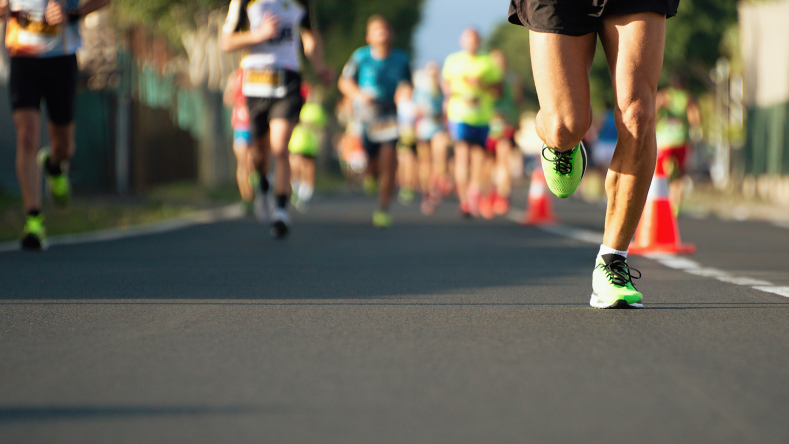Science-based tips for how to recover from overtraining
Studies continue to sing the praises of consistent exercise, but can you have too much of a good thing? From getting enough sleep to prioritizing protein, here’s what you need to know about how to recover from overtraining.

Whether you’re looking to beat a PR time or extend your mileage, you may find yourself pushed to the limit as you work to achieve your goals. And while these challenges can be rewarding, there is a fine line between rigorous training, dedication, and overdoing it.
Going too hard with your exercise or training regimen is a phenomenon referred to as overtraining, which can happen when you engage in too much exercise without having adequate time for recovery. Not only does this hinder progress, but it can also lead to a myriad of physical and psychological consequences that have a severe impact on both your performance and overall well-being.
Understanding the delicate balance between training and recovery is crucial if you’re striving for optimal performance. Recognizing the signs of overtraining and implementing the appropriate recovery strategies can mean the difference between sustainable progress and being sidelined by injury or burnout.
But before we dive into how to recover from overtraining, let’s first see what science has to say about what overtraining is, as well as some signs that you may be overdoing it.

What is overtraining?
Overtraining syndrome (OTS) is a condition where the body is subjected to excessive physical stress without adequate rest and recovery, leading to a decline in physical performance [ 1 2
Runners seem especially vulnerable to overtraining. It’s estimated that 60% of elite runners experience OTS, whereas 30-40% of high-level athletes for all sports are affected [ 3
Overreaching vs overtraining: what’s the difference?
Overreaching and overtraining are two similar concepts in the world of fitness, and while both involve pushing the body beyond its limits, they have different causes and consequences. Here’s the difference between overreaching and overtraining.
Overreaching: Overreaching is a short-term state of excessive volume or exercise intensity that can result in decreased athletic performance [
4
]. Although it typically results in additional fatigue and soreness for a few days, you can easily recover with additional rest and a specific recovery plan [5
].Overtraining: Overtraining is a long-term state of physical and mental exhaustion that occurs as a result of chronic, excessive training without adequate rest and recovery. It’s often characterized by two months or more of underperformance and can take months or even years to recover from [
5
].
Signs of overtraining
Overtraining can lead to a range of symptoms, which can have a significant negative impact on your quality of life. As such, you may find it challenging to carry out daily activities, let alone participate in sports or exercise.
Here are some of the most common signs of overtraining [ 6
Decreased performance
Chronic fatigue
Persistent muscle soreness
Insomnia or disrupted sleep patterns
Changes in mood
Lower immunity
Decreased appetite or weight loss
If you're experiencing any of these symptoms, it's essential to take a break from training and give your body time to rest and recover. Ignoring the signs of overtraining can lead to long-term physical and mental health problems.
3 tips for how to recover from overtraining

1. Focus on nutrition
When you overtrain, you put excess stress on your body, which can cause damage to your muscles and deplete your energy stores. Here are some ways you can use nutrition to help repair muscle damage, reduce inflammation, and promote recovery.
Stay hydrated. Dehydration can make it harder for your body to repair itself, so it’s important to ensure you’re getting enough fluids throughout the day (15.5 cups/day for men and about 11.5 cups/day for women).
Electrolytes
can also boost hydration levels, support muscle function, balance pH levels, and aid with performance and recovery.Consider taking supplements. Studies show that certain
supplements can help support recovery
from overtraining. However, not all supplements may be right for you, so talk with your healthcare provider before adding a new one to your routine.Increase your protein intake.
Protein
is a crucial macronutrient (especially forendurance athletes
), as it promotes the repair and growth of muscle tissue, prevents injury, and promotes overall strength [7
]. For optimal results, aim for 0.8-1.2 g of protein/kg of body weight/day, but you may need anywhere from 1.4 to 2 g/kg/day, depending on your activity levels and needs [8
]. Good sources of protein include lean meats, fish, poultry, beans, and nuts, but if you’re stuck in a rut,check out this article for other high-protein meals and snacks
for more inspiration.

Elo Smart Protein and post-workout recovery
Elo Smart Protein
Elo Smart Protein is also backed by the latest science to help you recover faster and get the most out of every scoop of protein powder. Try it out for yourself today

2. Prioritize rest and good quality sleep
Sleep is a vital component of the recovery process, as it facilitates both physical and mental restoration. During sleep, the body undergoes numerous regenerative processes, such as the release of growth hormones that stimulate muscle growth and repair, and the production of proteins that aid in tissue repair [ 9 10
For optimal performance and recovery, experts recommend getting between 7-9 hours of sleep nightly [ 11 11
If you have trouble falling or staying asleep, here are some
safe sleep supplements
that may help.

3. Implement stress management techniques
Overtraining can take a toll on both your physical and mental well-being, so it’s important to limit stress levels and foster a balanced state of mind.
If you’re feeling stressed out, consider deep breathing exercises, yoga, or mindfulness practices to help alleviate anxiety and promote relaxation. You can also try supplementation
Overtraining myths
Overtraining is a real condition that can have serious consequences, so here are some overtraining myths (and facts) to be aware of.
Myth: The more you train, the better your results will be.
Fact: More is not always better, as pushing too hard for too long can lead to a decline in performance and an increased risk of injury.
Myth: Pain is gain.
Fact: While some discomfort during exercise is normal, pain can be a sign of injury or overtraining. It's important to listen to your body and adjust your workouts accordingly.
Myth: Overtraining is only a concern for elite athletes.
Fact: Overtraining can affect anyone who engages in regular physical activity, regardless of their fitness level or training experience.
Summary
Overtraining is a serious condition that can have a detrimental impact on your physical and mental health. Even though anyone can be subject to this condition, it’s important to prioritize nutrition, hydration, and rest to help recover from overtraining.
Disclaimer: The text, images, videos, and other media on this page are provided for informational purposes only and are not intended to treat, diagnose or replace personalized medical care.
Key takeaways
Overtraining is a long-term state of exhaustion that requires significant time and effort to recover from.
Staying hydrated, eating enough protein (including
Elo Smart Protein
), and taking certain supplements can help repair muscle damage, reduce inflammation, and promote recovery.You can further promote recovery by focusing on adequate sleep and stress reduction techniques.
References
Kreher, J. B., & Schwartz, J. B. (2012). Overtraining syndrome: a practical guide. Sports health, 4(2), 128–138.
https://doi.org/10.1177/1941738111434406
Chung, Y., Hsiao, Y. T., & Huang, W. C. (2021). Physiological and Psychological Effects of Treadmill Overtraining Implementation. Biology, 10(6), 515.
https://doi.org/10.3390/biology10060515
Overtraining syndrome. Physiopedia. (n.d.). Retrieved April 14, 2023, from
https://www.physio-pedia.com/Overtraining_Syndrome
Kreher J. B. (2016). Diagnosis and prevention of overtraining syndrome: an opinion on education strategies. Open access journal of sports medicine, 7, 115–122.
https://doi.org/10.2147/OAJSM.S91657
Quaglio, L. (n.d.). 19 signs of overtraining: How to avoid excess fatigue and Ots. NASM. Retrieved April 14, 2023, from
https://blog.nasm.org/strategies-for-overcoming-overtraining
Elizabeth Quinn, M. S. (2022, October 17). What are the warning signs of overtraining syndrome? Verywell Fit. Retrieved April 14, 2023, from
https://www.verywellfit.com/overtraining-syndrome-and-athletes-3119386
Pasiakos, S. M., McLellan, T. M., & Lieberman, H. R. (2015). The effects of protein supplements on muscle mass, strength, and aerobic and anaerobic power in healthy adults: a systematic review. Sports medicine (Auckland, N.Z.), 45(1), 111–131.
https://doi.org/10.1007/s40279-014-0242-2
Campbell, B., Kreider, R. B., Ziegenfuss, T., La Bounty, P., Roberts, M., Burke, D., Landis, J., Lopez, H., & Antonio, J. (2007). International Society of Sports Nutrition Position Stand: Protein and exercise. Journal of the International Society of Sports Nutrition, 4(1).
https://doi.org/10.1186/1550-2783-4-8
Dáttilo, M., Antunes, H. K. M., Galbes, N. M. N., Mônico-Neto, M., DE Sá Souza, H., Dos Santos Quaresma, M. V. L., Lee, K. S., Ugrinowitsch, C., Tufik, S., & DE Mello, M. T. (2020). Effects of Sleep Deprivation on Acute Skeletal Muscle Recovery after Exercise. Medicine and science in sports and exercise, 52(2), 507–514.
https://doi.org/10.1249/MSS.0000000000002137
Diekelmann, S. (2014). Sleep for cognitive enhancement. Frontiers in Systems Neuroscience, 8.
https://doi.org/10.3389/fnsys.2014.00046
Bird, S. P. (2013). Sleep, recovery, and athletic performance. Strength & Conditioning Journal, 35(5), 43–47.
https://doi.org/10.1519/ssc.0b013e3182a62e2f







